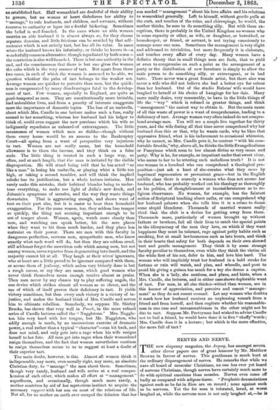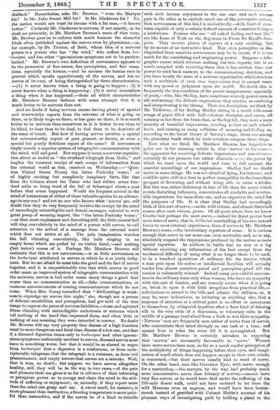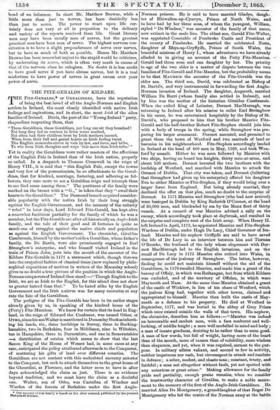NERVES AND NERVE- THE new sixpenny magazine, the Argosy, has
amongst severs. other clever papers one of great humour by Mr. Matthew Browne in favour of nerves. This gentleman is much hurt at the ordinary disparagement of nerves. He remarks that while we nave all heard of muscular Christians, no one has ever yet heard of nervous Christians, though nerves have certainly much more to do with spiritual emotions than muscles. Nerves even come off badly as compared with adipose tissue. "Prophetic denunciations against such as be fat in Zion are on record ; none against such as be nervous. Yet the fat man is tolerated, loved, at worst laughed at, while the nervous man is not only laughed at,—he is
disliked." Nevertheless, asks Mr. Browne, "were the Martyrs fat? Is Mr. John Stuart Mill fat? Is Mr. Gladstone fat ? No, the nation would not trust its income with a fat man,— it knows better," Certainly Mr. Gladstone is nervous, if not exactly, as we shall see presently, in Mr. Matthew Browne's sense of that term. Mr. Browne goes on to enforce with much humour the shameful libels often published against the nerves even by physicians,—as, for example, by Dr. Trotter, of Bath, whose idea of a nervous person is a person who has "the wind," who suffers from bor- -06origmi, and has other "ignominious symptoms not to be particu- larized." Mr. Browne's own definition of nervousness appears to be the possession of fine senses, fine perceptions, and fine sensa- tions, especially the former,—and he accuses the human race in general which speaks opprobriously of the nerves, and has no nerves of its own, of being distinguished by three characteristics, —(1) it never knows when a thing is going to happen ; (2) it never knows when a thing is happening ; (3) it never remembers a thing when it has happened ;—from all which characteristics Mr. Matthew Browne deduces with some triumph that it is much better to be nervous than not.
And no doubt if being nervous means having plenty of special and trustworthy reports from the universe of what is going on there, or is likely to go on there, or has gone on there, it is as much better to be nervous than unnervous as it is better to see than to be blind, to hear than to be deaf, to feel than to be destitute of the sense of touch. But how if having nerves involves a special but untrustworthy report of past, present, or future, or even a special but purely fictitious report of the same? If nervousness imply merely a superior system of telegraphic communication with the mind, well and good. But suppose it mean a nervous organiza- tion about as useful as "the overland telegraph from Galle," and implies the constant receipt of such scraps of information from the external world as this, received on Wednesday :—" Ques- tion United States Treaty tim latms Pashiaky worse," or of highly exciting but completely imaginary facts, like that from the Crimea about the Tatar who had ridden seven hun- dred miles to bring word of the fall of Sebastopol about a year before that event happened. Would the frequent arrival in the mind of intimations of either of these valuable species be an advant- age to any one ? and yet no one who knows what 'nerves' are, will doubt that they do very frequently involve the receipt by the mind .of exceedingly unintelligible and dismal messages, ushered in with great pomp of seeming import, like " tim latms Pashiaky worse ;" --or that, more unpleasant and disturbing still, the little mental bell will ring convulsively in the mind of a person with nerves, to call attention to the arrival of a message from the external world which does not arrive at all. The pale imagination watches the bell vibrating convulsively, like bells ringing in an empty house which are pulled by no visible hand,—and nothing (but terror) comes of it. Perhaps Mr. Matthew Browne will maintain that this is not nervousness,—is as little nervousness as the borborignai attributed to nerves at which he is so justly indig- nant. But we are afraid he must take the good and the bad of nerves together, and it is unquestionably true that while nerves in good order mean an improved system of telegraphic communication with the universe, nerves in bad order mean many things a good deal worse than no communication at all,—false communications, or ominous announcements of coming communications which do not come. When Mrs. Gamp remarked that " fiddlestrings is weak- ness to expredge my nerves this night," she, though not a person of delicate sensibilities and perceptions, had got hold of the true image to express the pains of nervous liabilities,—tense and agitated fibres vibrating with unintelligible undertones or screams which tell nothing of the hand that impressed them, and often little or nothing of any meaning they were intended to convey. No doubt Mr. Browne will say very properly that disease of a high function must be more dangerous and fatal than disease of a low one, and that if a diseased digestion issues only in borborigmi and other ignomi- nious symptoms maliciously ascribed to nerves, diseased nerves must issue in something worse, but that it would be as absurd to argue from borborigmi that a digestion is a misfortune, or from unde- cipherable telegrams that the telegraph is a nuisance, as from evil presentiments, and empty terrors that nerves are a mistake. Well, that is true, no doubt; but suppose we have nerves altogether healthy, still they will be in the way in two eases,—if the pain and pleasure their use gives is so fax in advance of their informing or percipient power as to occupy and chain the mind in the atti- tude of suffering or enjoyment ; or, secondly, if they report more than the mind can grasp and use. A sweet smell, for instance, is more pleasant than instructive, a freezing temperature is more pain- ful than instructive, and if the nerves be of a kind to tremble with such intense enjoyment in the one case and such intense pain in the other as to exclude much use of the perceptive nerves, then nervousness of this kind is undoubtedly—with limited crea- tures capable of only a certain defined amount of conscious being- s misfortune. Persons who are "all naked feeling and raw life" are like Isaac of York on the dog-irons in Front De Bceurs dun- geon. They receive plenty of reports of a very exciting, but by no means of an instructive kind. Nay, even perceptive as dis- tinguished from sensitive nervousness may be in excess, if it is too much for the considering and originating power. Suppose a tele- graphic centre which receives nothing but true reports, but is so much occupied with receiving them that it has neither time nor power to send back answers to the communicating districts, and you have nearly the state of a nervous organization which receives such a multitude of even true impressions that it cannot react with any power or judgment upon the world. No doubt this is frequently the true condition of the poetic temperament, especially of poets,—who, like Shelley, have sometimes scarcely power even to sift and arrange the delicate impressions they receive, so confusing and overpowering is the throng. There is a description, we think by Mr. Trelawny, of his finding Shelley sitting in a wood, with some scraps of paper filled with half-coherent thoughts and verses, all teeming so fast from his brain that, as Shelley felt, they were a mere anarchy of beautiful impressions, treading as fast on each other's heels, and causing as many collisions of meaning and feeling as, according to the latest theory of Saturn's rings, there are among the planetary beads which by their rotation compose those rings.
Now what we think Mr. Matthew Browne has forgotten to point out in his amusing article is, that ' nerves ' in his sense — the apparatus for receiving delicate impressions and sensations— certainly do not promote but rather diminish nerve, the power by which we react upon the world and turn to full account the anarchic assemblage of our impressions. Shelley had no doubt nerve in some things. He was not afraid of dying, for instance, and could lie quite still in a boat in perfect tranquillity in the immediate prospect of drowning, and without being able to swim a stroke. But this was rather deficiency in love of life than the nerve which resists disturbing influences, concentrates all available and service- able impressions for immediate use, and so organizes the mind for the purposes of life. It is clear that Shelley had exceedingly little of this sort of nerve,—as his wild visions, and almost disturbed reason after such visions, prove. Of all poets whose lives we know Goethe had perhaps the most nerve,---indeed his finest poems bear more trace of nerve, that is, deliberate marshalling of his own inward forces to meet external experiences, than of nerves in Mr. Matthew Browne's sense, —the involuntary reporters of sense. It is curious enough that nerve in our sense can even neutralize and, so to say, absolutely suspend the impressions produced by the nerves as mere special reporters. As soldiers in battle lose an arm or a leg without receiving any information of the fact except from the mechanical difficulty of using what is no longer there to be used, so in a hundred operations of ordinary life the tension which a man puts upon his active or intellectual faculties will actually render him almost sensation-proof and perception-proof till the tension is voluntarily relaxed. Indeed many men exhibit nervous- ness in the ordinary sense only when women, who have no sympathy with this sort of tension, and are scarcely aware when it is going on, break in upon it with little irruptions from practical life,— solicitations to attend to the bills and admire the children, or, it may be, mere indications, as irritating as anything else, that a suspense of attention at a critical point is no effort or annoyance to themselves, by whispered inquiries after a finer kind of darning silk in the very crisis of a discussion, or voluntary exits in the middle of a passage read aloud from a book to win their sympathy. ' Nervous ' men are frequently men rather of nerve than of nerved, who concentrate their mind strongly on one task at a time, and cannot bear to relax the reins till it is accomplished. But Mr. Matthew Browne is certainly mistaken in supposing that 'nerves' are necessarily favourable to 'nerve.' Women have more nerves than men, so far as a much readier perception of the multiplicity of things happening before their eyes, and imagi- nation of much which does not happen except in their own minds, is concerned,—but their nerves usually lead to want of nerve. On the other hand, men hire Governor Eyre, with nerve enough for a martyrdom,—the martyrs, by the way, had probably much more concentrative nerve than delicacy of nerves,—cannot have very fine nerves, or he would have died under the suffering of his 700-mile desert walk, could not have endured to let loose the wild Maroons even on negroes, and would have been horror- struck instead of gratified with Colonel Hobbs's account of his pleasant ways of investigating guilt by holding a pistol to the
head of an informer. In short Mr. Matthew Browne, while a little more than just to nerves, has been decidedly less than just to nerve. The power to react upon life cer- tainly does not vary at all in proportion to the delicacy and variety of the reports received from life. Great literary men may have been usually men of nerves, but the greatest practical men have been men of nerve. The highest nervous con- stitution is to have a slight preponderance of nerve over nerves, but to have as much of both as possible. Hence Mr. Matthew Browne has been somewhat unjust to the stupid world he criticizes, by underrating its nerve, which is often veiy much in excess of that of the nervous class he eulogizes. No doubt it is less credit to have good nerve if you have obtuse nerves, but it is a real misfortune to have power of nerves in great excess over your power of nerve.




































 Previous page
Previous page